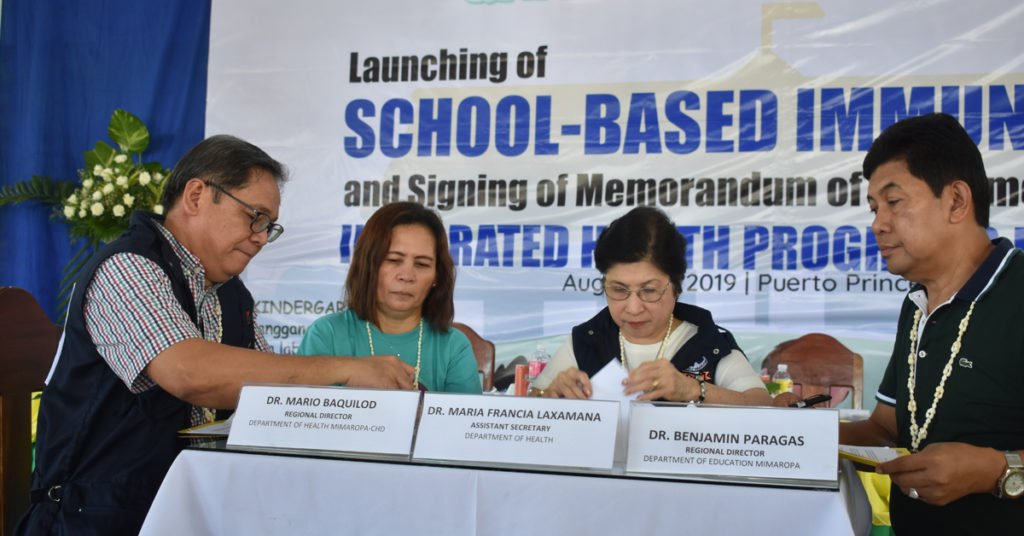The Department of Health (DOH) and the Department of Education, during the recent launching of the school-based immunization in Puerto Princesa City, urged parents and caregivers to allow their children to undergo immunization to protect them from common diseases and life-threatening illnesses.
The school-based immunization program encouraged mothers and caregivers to avail of the government’s free immunization services to provide children, as well as adolescents, greater protection against vaccine-preventable diseases.
Assistant Health Secretary Dr. Maria Francia Laxamana emphasized that vaccination will help protect the children from common illnesses.
“We would like to let you know that the DOH encouraged mothers and caregivers of pre-schoolers to Grade 7. This is a basic protection to common household illnesses and at the same time an opportunity to children who missed their vaccination. Through this, they are protected by life threatening disease. So we encourage everyone, because only learners with parental consent will be vaccinated,” she said.
The school-based immunization is a strategy for reaching older children and adolescents. The program aims to reach a total of 9,913,032 learners nationwide that targets school children for measles vaccination and booster shots of Tetanus-diphtheria.
For the 2019 school-based immunization, school children from kindergarten to Grade 7 (K – 7) are the target population to be vaccinated.
DepEd Puerto Princesa City Schools Division Superintent, Susana Bautista, expressed support to the national government’s immunization program. She likewise urged the parents, guardians, and caregivers to consider having the children immunized.
“Tuloy-tuloy po ang aming suporta sa immunizations, although ang support ng magulang ang hindi pa namin segurado. Sana po ay marating natin ang 95 percent target,” she said.
The DOH revealed about 90 percent of those infected with measles nationwide are unvaccinated and the low trust in the immunization drive may be attributed to controversial anti-dengue vaccine Dengvaxia.
ASec. Laxamana admitted that there are still parents who refuse to let their children immunized due to fear of Dengvaxia, but she explained that the SBI is different from that since the purpose here is to eliminate measles.
”This is a different immunization, and not Dengvaxia. Iba ang bakuna na ibibigay natin. It is a measles containing vaccine, laban po sa tipdas. Sana ay unti-unting makikita ng mga magulang ang importansya ng vaccination na ito,” she explained.
She told during the press conference that one of the reasons why there are outbreak like what happened to measles outbreak is because of migration.
“Migration is number one factor kung bakit nagkakaroon ng outbreak. Pinaka-una natin na measules natin noong 2017 yun yung after ng Marawi Seige. Noon ay lumabas na ang measles outbreak sa Davao, Lanao at iba pa. Ito ay na-trace ng aming Epidemiology Bureau na ito nga ay nanggaling sa Marawi,” she said.
Director Baquilod said that although it is a challenge on their part to conduct the vaccination in Palawan considering its geography, the location of the municipalities.
He was pleased to inform during the press conference that the people in the region supported the government’s immunization since MIMAROPA was ranked second in the country.
“Pangalawa ang ating region as far as trust rating (of immunization) is concerned. Before nitong School-Based Immunization ay nagkaroon tayo ng community-based, nag bahay-bahay. Itong ginagawa nating immunization ay challenge yan kasi ang Palawan ay napakahaba. Ang (personnel) augmentation ng (DOH) Central Office will be distributed sa mga island-muniipalities,” he said.
The DOH’s school-based immunization program aims to reach more children, especially with the yearly increase in the number of enrollees. Piloted in 2013 in selected provinces and cities nationwide, in August 2015, the DOH, in collaboration with Department of Education and the Department of Interior and Local Government, successfully conducted vaccinations in 38,688 public schools nationwide providing a second dose for measles and booster doses for diphtheria and tetanus. Since then, August has been declared School-Based Immunization month and the program has become an annual activity.
School-based immunization pre-implementation started June 2019 while actual vaccination using selective strategy in the country’s different regions will continue until September 2019.
